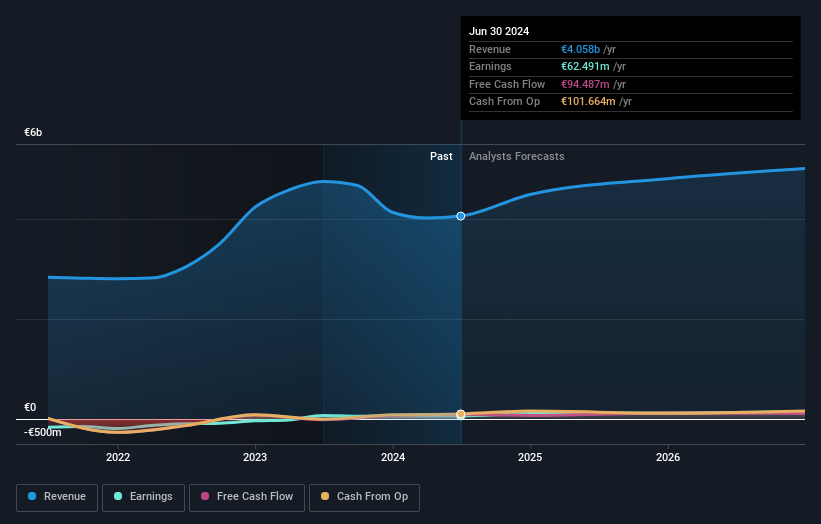- Spain
- /
- Energy Services
- /
- BME:TRE
Despite delivering investors losses of 42% over the past 5 years, Técnicas Reunidas (BME:TRE) has been growing its earnings

In order to justify the effort of selecting individual stocks, it's worth striving to beat the returns from a market index fund. But every investor is virtually certain to have both over-performing and under-performing stocks. So we wouldn't blame long term Técnicas Reunidas, S.A. (BME:TRE) shareholders for doubting their decision to hold, with the stock down 46% over a half decade. But it's up 7.7% in the last week.
Although the past week has been more reassuring for shareholders, they're still in the red over the last five years, so let's see if the underlying business has been responsible for the decline.
See our latest analysis for Técnicas Reunidas
While the efficient markets hypothesis continues to be taught by some, it has been proven that markets are over-reactive dynamic systems, and investors are not always rational. One imperfect but simple way to consider how the market perception of a company has shifted is to compare the change in the earnings per share (EPS) with the share price movement.
Técnicas Reunidas became profitable within the last five years. That would generally be considered a positive, so we are surprised to see the share price is down. Other metrics might give us a better handle on how its value is changing over time.
The revenue fall of 0.9% per year for five years is neither good nor terrible. But it's quite possible the market had expected better; a closer look at the revenue trends might explain the pessimism.
You can see below how earnings and revenue have changed over time (discover the exact values by clicking on the image).

It is of course excellent to see how Técnicas Reunidas has grown profits over the years, but the future is more important for shareholders. Take a more thorough look at Técnicas Reunidas' financial health with this free report on its balance sheet.
What About The Total Shareholder Return (TSR)?
We've already covered Técnicas Reunidas' share price action, but we should also mention its total shareholder return (TSR). The TSR is a return calculation that accounts for the value of cash dividends (assuming that any dividend received was reinvested) and the calculated value of any discounted capital raisings and spin-offs. Técnicas Reunidas' TSR of was a loss of 42% for the 5 years. That wasn't as bad as its share price return, because it has paid dividends.
A Different Perspective
It's good to see that Técnicas Reunidas has rewarded shareholders with a total shareholder return of 34% in the last twelve months. There's no doubt those recent returns are much better than the TSR loss of 7% per year over five years. This makes us a little wary, but the business might have turned around its fortunes. I find it very interesting to look at share price over the long term as a proxy for business performance. But to truly gain insight, we need to consider other information, too. Consider risks, for instance. Every company has them, and we've spotted 1 warning sign for Técnicas Reunidas you should know about.
But note: Técnicas Reunidas may not be the best stock to buy. So take a peek at this free list of interesting companies with past earnings growth (and further growth forecast).
Please note, the market returns quoted in this article reflect the market weighted average returns of stocks that currently trade on Spanish exchanges.
Valuation is complex, but we're here to simplify it.
Discover if Técnicas Reunidas might be undervalued or overvalued with our detailed analysis, featuring fair value estimates, potential risks, dividends, insider trades, and its financial condition.
Access Free AnalysisHave feedback on this article? Concerned about the content? Get in touch with us directly. Alternatively, email editorial-team (at) simplywallst.com.
This article by Simply Wall St is general in nature. We provide commentary based on historical data and analyst forecasts only using an unbiased methodology and our articles are not intended to be financial advice. It does not constitute a recommendation to buy or sell any stock, and does not take account of your objectives, or your financial situation. We aim to bring you long-term focused analysis driven by fundamental data. Note that our analysis may not factor in the latest price-sensitive company announcements or qualitative material. Simply Wall St has no position in any stocks mentioned.
About BME:TRE
Técnicas Reunidas
An engineering and construction company, designs and manages industrial plant projects worldwide.
Solid track record with excellent balance sheet.
Similar Companies
Market Insights
Community Narratives



